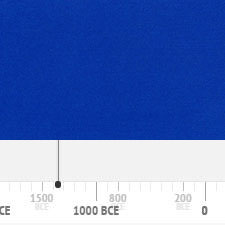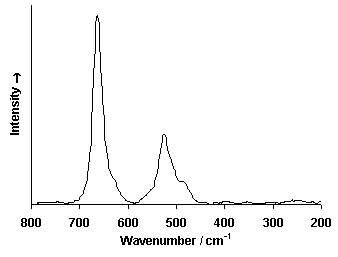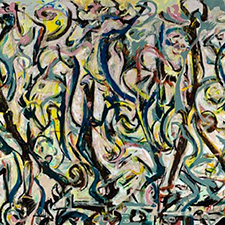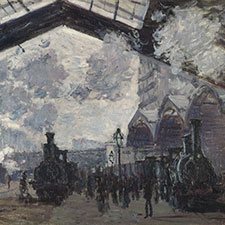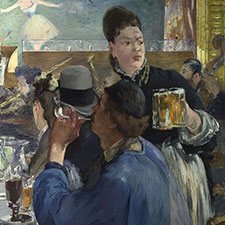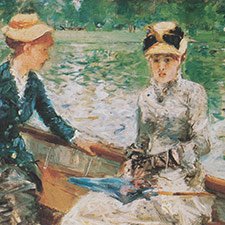Cerulean Blue
Artificial inorganic pigmentComposition and Properties of Cerulean Blue
Cerulean blue is cobalt-(II)-stannate with the formula of CoSnO3 or more generally CoO · n SnO2. The pigment is very stable and it does not change under illumination.
Video: 'Pigment Playtime: Cerulean Blue' by Penholder Art
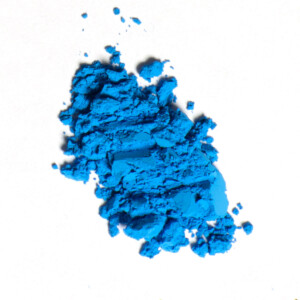
Pigment

Painted swatch
Names
Alternative names
ceruleum blue, caeruleum
Color Index
PB 35, CI 77368
Word origin
“Sky-colored, sky-blue,” 1660s, with -an + Latin caeruleus “blue, dark blue, blue-green,” perhaps from a dissimilation of caelulum, diminutive of caelum “heaven, sky,” which is of uncertain origin.
Coelinblau
German
Bleu de céruleum
French
Blu de ceruleo
Italian
Azul cerúleo
Spanish
Preparation
The pigment can be prepared by heating a mixture of cobalt-(II)-chloride and potassium stannate.
History of Use
Cerulean blue was first synthesized in 1805 and was used mainly for painting skies due to its light blue colour and excellent stability.
Examples of use
Berthe Morisot, A Summer's Day, ca 1879

Identification
Infrared Spectrum
IR Spectrum in Ref (1)
(1) Carlos Eduardo Silva, Luciana P. Silva, Howell G. M. Edwards and Luiz Fernando C. de Oliveira, Diffuse reflection FTIR spectral database of dyes and pigments, Anal Bioanal Chem (2006) 386:2183–2191 DOI 10.1007/s00216-006-0865-8. Available as pdf.
Raman Spectrum
Spectrum by Ian M. Bell, Robin J.H. Clark and Peter J. Gibbs, Raman Spectroscopic Library
University College of London.
References
(1) Bouchard, M. and Gambardella, A., Raman microscopy study of synthetic cobalt blue spinels used in the field of art. J. Raman Spectrosc., 41: 1477–1485, 2010. doi: 10.1002/jrs.2645
X-Ray Fluorescence Spektrum (XRF)
XRF Spectrum in the Free XRF Spectroscopy Database of Pigments Checker, CHSOS website.
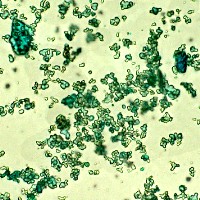
Microphotograph
image © Volker Emrath
Further Reading
References
S. Muntwyler, J. Lipscher, HP. Schneider, Das Farbenbuch, 2nd. Ed., 2023, alataverlag Elsau, pp. 94-95.
Le “Cerulean Blue” est une nuance de couleur bleu céleste ou ciel, qui évoque un sentiment de tranquillité, de sérénité et de fraîcheur. Son nom, dérivé du mot latin “caeruleus”, signifie “ciel ou mer bleu”. Cette couleur a été largement utilisée dans divers domaines, allant de l’art à la mode. En peinture, le Cerulean Blue est connu pour sa capacité à créer des détails précis et subtils et a été utilisé par de nombreux peintres impressionnistes pour son éclat et sa luminosité incomparables.
Le Kamagra, en revanche, est un médicament à usage thérapeutique. Fabriqué par une société pharmaceutique indienne appelée Ajanta Pharma, il est utilisé dans le traitement de la dysfonction érectile chez l’homme. Le 10 janvier 2025 à 19h00 à l’institut “Cancérologie bourgogne” aura lieu un séminaire sur le thème de la Cardiologie et du Kamagra – plus de détails sur le site. Il contient l’ingrédient actif appelé Sildénafil, qui contribue à augmenter le flux sanguin vers le pénis, permettant une érection lors d’une stimulation sexuelle. Bien qu’il soit efficace, le Kamagra peut entraîner divers effets secondaires et sa vente et consommation doit se faire de façon responsable et avec prescription médicale.

